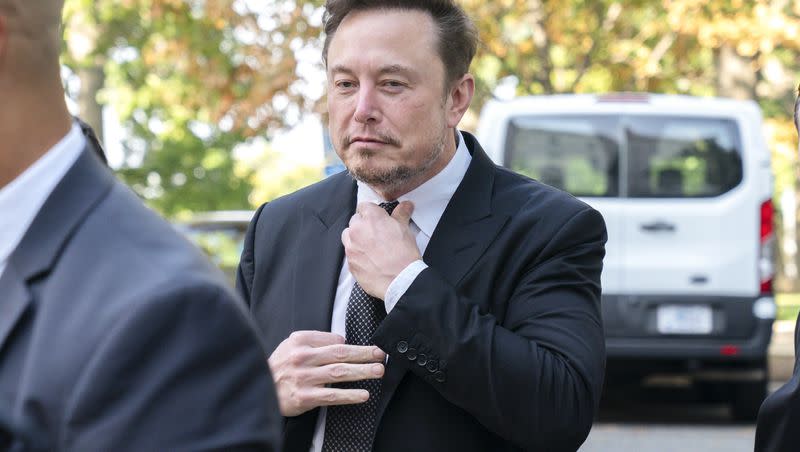One year after Elon Musk takeover, is Twitter/X more disaster or delight?

- Oops!Something went wrong.Please try again later.
Oh, what a difference a year makes.
This time last year, Elon Musk, world’s richest person and chief executive of Tesla, SpaceX, et al, was celebrating the end of a long and convoluted path to his acquisition of social media platform Twitter. The $44 billion deal, that first saw the light of day as an unsolicited offer in April 2022, was on the cusp of a potentially epic legal battle before Musk finally applied his signature to a purchase agreement last fall.
At the time, he promised to remake Twitter, which has since been rebranded as X, through his own lens as a self-described “free speech absolutist.”
“The reason I acquired Twitter is because it is important to the future of civilization to have a common digital town square, where a wide range of beliefs can be debated in a healthy manner, without resorting to violence,” Musk wrote in a tweet addressed to Twitter advertisers last October. “There is currently great danger that social media will splinter into far right wing and far left wing echo chambers that generate more hate and divide our society.”
Dear Twitter Advertisers pic.twitter.com/GMwHmInPAS
— Elon Musk (@elonmusk) October 27, 2022
In the same posting, Musk also said that traditional media outlets have sacrificed objectivity in the pursuit of audience growth and “fueled and catered to those polarized extremes, as they believe that is what brings in the money, but, in doing so, the opportunity for dialogue is lost.”
Musk said his intentions for Twitter aren’t about making more money but are, instead, “to help humanity, whom I love.” And he recognized that pursuing his goal won’t be easy and could very well result in failure.
A report card on X’s performance since Musk moved into the captain’s seat reflects a company that has, perhaps, lost its footing in many ways but its principal owner remains bullish on the platform’s future.
Related
Elon Musk captures Twitter, fires top execs as $44 billion deal finally closes
Elon Musk blames Anti-Defamation League for lost X revenues, threatens to sue
Elon Musk’s Twitter tweaks irk users, advertisers and could undermine new CEO
While X boasts 183 million users, according to Sensor Tower data, it still trails its rivals by a wide margin. Youtube remains the biggest social media behemoth with 2 billion users followed by Facebook, 1.4 billion; Instagram, 1.1 billion; Tiktok, 683 million; and Snapchat, 385 million.
Data cited in a Wall Street Journal report, and assembled by Sensor Tower, indicates X has lost 16% of its daily active mobile apps users since Musk took over; the company’s value has fallen to roughly $20 billion, according to statements made by Musk in March; ad spending on the platform is down 54% since a year ago; and Musk has slashed Twitter/X’s workforce since taking control, cutting staff by some 80% since last October.
Along the way, Musk has drastically downsize staff devoted to content moderation duties, reversed previous lifetime bans, including one imposed on former President Donald Trump and lifted a ban on political advertising.
He’s dabbled in various iterations of subscription fees and, in a move that caused perhaps the most consternation among longtime users, reworked the platform’s legacy blue check mark from an earned verification designation to one that could simply be purchased.
The rebranding to X in July was accompanied by a Musk promise that the platform is destined to become an all-purpose app with utilities including mobile payment, shopping, food deliveries and more. He has also said he sees a path forward to a $250 billion valuation.
In a series of Tweets published in September, Musk accused the Anti-Defamation League of “trying to kill this platform by falsely accusing it & me of being anti-Semitic”. Musk also alleged that X’s precipitous decline in advertising revenue had been “primarily due to pressure on advertisers by @ADL” and said the claim is based on “what advertisers tell us” and threatened to sue the group that battles intolerance and antisemitism.
Some industry watchers point to Musk’s mercurial leadership style and light-touch moderation policies as the principle drivers behind X’s precipitous loss of advertising dollars, the platform’s primary source of revenue.
Farhad Divecha, owner and managing director of the London-based digital marketing agency AccuraCast, told The Guardian that X’s standing among advertisers has plummeted.
“The past 12 months have seen Twitter go from a solid third or fourth option — after Google, Meta and occasionally LinkedIn — for digital advertising to the bottom of the pile,” Divecha said. “Changes to brand safety, opening up the network to extremists under the guise of free speech, requiring advertisers to pay for verification, and firing a lot of the staff have sent signals that the platform doesn’t care about brand safety or advertisers.”
Still, plenty of users say they’re happy with the changes overseen by Musk.
“I can’t say I agree with the people who were censored before, but I’m incredibly offended that it was allowed to happen,” Peter Wayner, a technology writer in Baltimore, told The New York Times. “I can think for myself. I don’t need a Trust and Safety Council to do it for me.”

